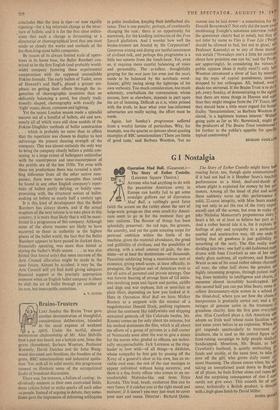G I Nostalgia
ANYONE who had anything to do with the peacetime American army in Europe can hardly fail to get some nostalgic guffaws out of Operation Mad Bull, a rattlingly good farce (with the accent on the rattle) about the sort of large-scale goings-on that even small-fry Ameri- cans seem to go in for the moment they get into uniform. The flavour of things has been splendidly preserved: the red tape, the grouses, the anarchy, and yet the quite amazing scope for personal ambition within the limits of the machine, given the material abundance, the greed and gullibility of civilians, and the possibility of altering, with a small amount of guile, the des- tinies—or at least the destinations—of thousands. Peacetime soldiering being a monotonous sort of existence, giving small scope, at least officially, to strategists, the brighter sort of American went in for all sorts of personal and private strategy. One was forever hearing of strange feats of GI initia- tive involving jeeps and liquor and parties, airlifts and dogs and war orphans, licit or semi-licit or plain illicit, depending on how you looked at it. Here in Operation Mad Ball we have Mickey Rooney as a sergeant with the manner of a megalomaniac Donald Duck, pushing regiments about the continent like tiddlywinks and shipping unwanted generals off like Colorado beetles. Mr. Rooney comes on for only about ten minutes, but his method dominates the film, which is all about the efforts of a group of privates in a dull corner of Normandy soon after the war to give a dance for the nurses who, graded as officers, are techni- cally unapproachable. Jack Lemmon as the ring- leader in love with—of all things—a dietician, whose sympathy he first gets by passing off the X-ray of a general's ulcer as his own, has an en- viable cool ease; the rest of the cast manages to appear individual without being eccentric, and there is a fine fruity officer who comes to an un- comfortable Malvolio-like end from Ernie Kovaks. This loud, brash, exuberant film can be very funny if it catches you at the right mood and moment; if it doesn't you may just want to cover your ears and moan. Director: Richard Quine. The Story of Esther Costello might have b roaring farce, too, though quite unintentiona if it had not had in it Heather Sears's touch performance as a blind, deaf-and-dumb whose plight is exploited for money by her p moters. Among all the tinsel of plot and act there suddenly turns up -this performance solid, 22-carat integrity, with Miss Sears man ing not only to act the rest of the (very expt enced) cast off the screen, but even to make c take Nicholas Monsarrat's preposterous story heart a bit, or at least to believe her part in And a rather horrid tale it is, for it exploits feelings of pity and sympathy in a particula morbid and unattractive way, till one ends feeling that all goodness is just gullibility something of the sort). The film really wa dividing into two: one half is old-fashioned me drama with Joan Crawford as one of her usl steely glum matrons, all eyebrows, and Rossa Brazzi as one of his usual rather odious charm all eyes; the other half shows the genuine a highly interesting progress, through patient tra ing, from bestiality to intelligence and charm, someone almost incredibly handicapped. this second half you can put Miss Sears; some t cellent documentary-style scenes in a school the blind-deaf, where you see how the chaos inexpression is gradually sorted out; and a 1 twinges of genuine satire in the treatment grandiose charity. Into the first goes everythi else. Miss Crawford plays a rich American vi adopts an Irish waif whose main faculties we lost some years before in an explosion. When girl responds spectacularly to treatment as kindness, she is used as the central figure in fund-raising campaign to help people similar handicapped. Meantime, Mr. Brazzi, as M Crawford's husband, is quietly embezzling t funds and unable, at the same time, to take 1 eyes off the girl, who grows daily rosier al more blooming. The climax comes when, his el taking an unexplained jaunt down to Brighte of all places, he finds Esther alone and rapes 111 And the surprising consequence of that I me surely not give away. This smooth bit of BO sense, technically a British product, is direct with a high-gloss finish by David Millar.
ISABEL WWI






























 Previous page
Previous page